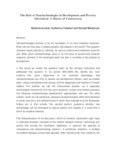
Please use this identifier to cite or link to this item:
http://ricaxcan.uaz.edu.mx/jspui/handle/20.500.11845/231Full metadata record
| DC Field | Value | Language |
|---|---|---|
| dc.contributor.other | 0000-0002-7441-3233 | - |
| dc.contributor.other | 0000-0003-2866-3650 | - |
| dc.coverage.spatial | Global | es_ES |
| dc.creator | Foladori, Guillermo | - |
| dc.creator | Invernizzi, Noela | - |
| dc.creator | Maclurcan, Donald | - |
| dc.date.accessioned | 2017-05-12T20:07:44Z | - |
| dc.date.available | 2017-05-12T20:07:44Z | - |
| dc.date.issued | 2007-11-14 | - |
| dc.identifier | info:eu-repo/semantics/publishedVersion | - |
| dc.identifier.issn | 1833-122X | es_ES |
| dc.identifier.uri | http://hdl.handle.net/20.500.11845/231 | - |
| dc.description.abstract | Nanotechnologies promise to be the foundation of the next industrial revolution. What role can they play in abating poverty and inequity in the world? This question has been raised, directly or indirectly, by various authors and institutions since the year 2000, when nanotechnology came to be the focus of government research programs, primarily in the developed world but also in countries in the process of development. In this article we review the positions taken by the principle institutions that addressed that question in the period 2000-2006. We identify two main positions. One gives importance to the technical advantages that nanotechnologies can offer to resolve key development themes, such as potable water, cheap and pollutant-free energy, and the diagnoses and treatment of health matters. This position we call the instrumental position, as it separates technological instruments from the socio-economic context and market pressures that influence nanotechnology development, appropriation and use. The other position, which we call contextual, analyzes nanotechnologies within the framework of social, economic and political forces in which they originate and are developed. Arising out of that context, this second position questions whether new technologies can be leveraged to reduce poverty and inequity in a world that is driven by lucrative interests. | es_ES |
| dc.language.iso | eng | es_ES |
| dc.publisher | International Foundation for the Advancement of Technology | es_ES |
| dc.relation | http://www.azonano.com/article.aspx?ArticleID=2041 | es_ES |
| dc.relation.uri | generalPublic | es_ES |
| dc.rights | openAccess | es_ES |
| dc.rights.uri | http://creativecommons.org/licenses/by-nc-sa/3.0/us/ | * |
| dc.source | Journal of Matrerials Online. | es_ES |
| dc.subject.classification | TECNOLOGÍA Y CAMBIO SOCIAL [630707] | es_ES |
| dc.subject.other | info:eu-repo/classification/Nanotecnología - Desarrollo | - |
| dc.subject.other | info:eu-repo/classification/Tecnología - Desarrollo | - |
| dc.subject.other | info:eu-repo/classification/Inequidad tecnológica | - |
| dc.title | The Role of Nanotechnologies in Development and Poverty Alleviation: A Matter of Controversy | es_ES |
| dc.type | article | es_ES |
| Appears in Collections: | *Documentos Académicos*-- UA Estudios del Desarrollo | |
Files in This Item:
| File | Description | Size | Format | |
|---|---|---|---|---|
| Folador, Guillermo. The Role of Nanotechnologies in Development and Poverty Alleviation.pdf | Versión publicada | 499,58 kB | Adobe PDF |  View/Open |
This item is licensed under a Creative Commons License
